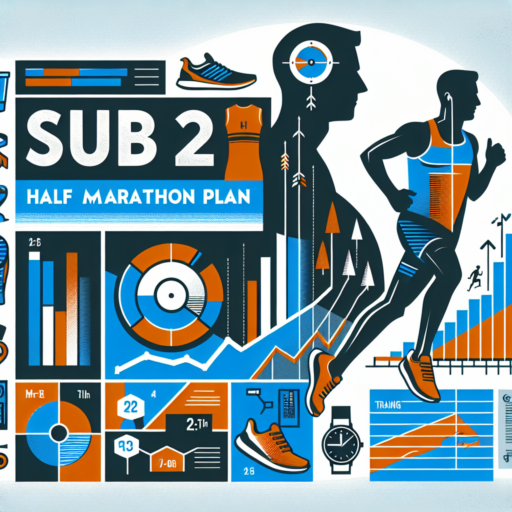What is the training pace for a sub 2 hour half marathon?
Achieving a sub 2 hour half marathon is a common milestone for many runners, indicating a significant level of endurance and speed. To accomplish this, understanding and maintaining the correct training pace is crucial. For a half marathon time of under two hours, runners need to average a pace of approximately 9:09 minutes per mile (or 5:41 minutes per kilometer). However, training paces will vary depending on the workout type.
Types of Training Runs and Their Paces
- Long Runs: These are foundational for endurance building. Training long runs slightly slower than your goal pace, around 9:30 to 10:30 minutes per mile, helps in conserving energy and increasing stamina without overexerting.
- Tempo Runs: Tempo runs are crucial for improving metabolic fitness. For a sub 2 hour goal, aiming for a pace of 8:45 to 9:00 minutes per mile in these sessions helps in adapting your body to sustain a faster pace over the distance.
- Interval Training: This involves short bursts of speed followed by recovery periods. For intervals, running at 8:00 to 8:30 minutes per mile pace will enhance your speed and aerobic capacity.
Remember, the key to effectively training for a sub 2 hour half marathon lies not just in maintaining these individual paces, but in incorporating a variety of runs at different paces tailored to enhance both your speed and endurance capabilities. Balancing your training with adequate rest and recovery is equally essential to avoid injury and ensure consistent performance improvements.
No se han encontrado productos.
What pace is a 21km race in 2 hours?
Understanding the pace for a 21km race completed in 2 hours is crucial for runners aiming to set realistic goals or tailor their training plans. This specific target splits down to a pace that many find achievable with the right preparation. By breaking down the overall distance and time goal, runners can better manage their energy and speed throughout the race.
When calculating the pace for a 21km race in 2 hours, we find that it equates to running each kilometer in approximately 5 minutes and 43 seconds. This pace is often regarded as moderate and is achievable for a wide range of runners, from beginners to more seasoned athletes. This speed allows for a steady yet manageable exertion level, avoiding burnout early in the race while still maintaining a consistent performance across the distance.
Different strategies can be employed to maintain this pace, including interval training, consistent long runs, and proper pacing during the race itself. Runners might find it beneficial to participate in pace groups during the race or use modern technology like smartwatches to keep track of their speed. Maintaining an even pace is key to completing a 21km race in the desired 2 hours without hitting the proverbial ‘wall’ too early.
Can you do a half marathon in 8 weeks?
Embarking on the journey to run a half marathon in 8 weeks is an ambitious goal that captures the imagination of many runners, both novices and those with a bit of experience under their belts. The question isn’t just about physical capability; it digs deeper into the realm of determination, planning, and the ability to adhere to a disciplined training regimen. While it’s a challenging endeavor, success hinges on your starting fitness level, your commitment to training, and perhaps most importantly, your mental fortitude.
For those starting with a baseline of running experience, whether it’s consistently running shorter distances or having a couple of 5Ks to their name, the 8-week timeline is tight but feasible. The key is to find a balanced training plan that increases mileage gradually, avoiding the common pitfall of overtraining and the risk of injury that it carries. Incorporating days for rest, recovery, and cross-training is critical to improving your running stamina and overall fitness without overburdening your body.
Nutrition and hydration also play pivotal roles in your ability to train effectively and recover efficiently. Adapting your diet to support your increased energy needs will help fuel your runs and aid in the repair of muscles post-workout. Likewise, mastering the art of hydration can prevent the performance-degrading effects of dehydration, particularly during long training runs and, ultimately, the race itself.
Is Runna worth the money?
When it comes to investing in a new product like Runna, potential customers often wonder about its value for the money. This question isn’t just about the price but involves evaluating the comprehensive benefits that Runna offers in comparison to its cost. By looking into what Runna brings to the table, consumers can make an informed decision on whether it aligns with their needs and budget constraints.
Runna’s unique selling points are at the forefront of this discussion. What sets it apart from its competitors, and how do these features translate into real-world advantages for the user? It’s not just about having innovative features but about how these functionalities can enhance user experience and productivity in significant ways. Evaluating these aspects could be the key to understanding Runna’s overall worth.
Long-Term Savings vs. Initial Investment
Another angle to consider when assessing Runna’s value is the balance between the initial investment and potential long-term savings. Runna’s durability, energy efficiency, or any subscription-based services that might reduce costs in other areas of life can contribute to its worth over time. Analyzing these factors will help paint a clearer picture of whether the product is a financially sound choice.




